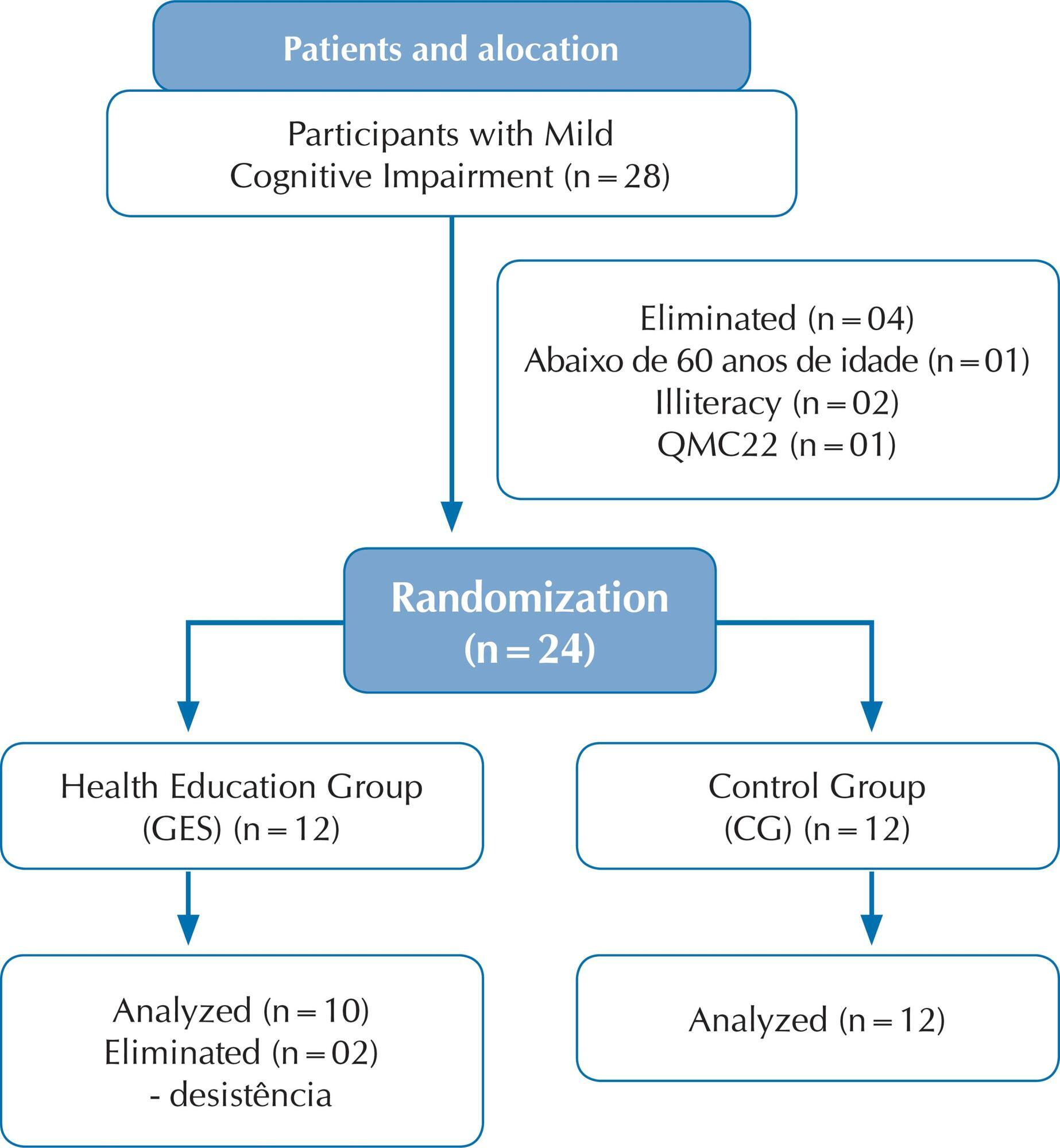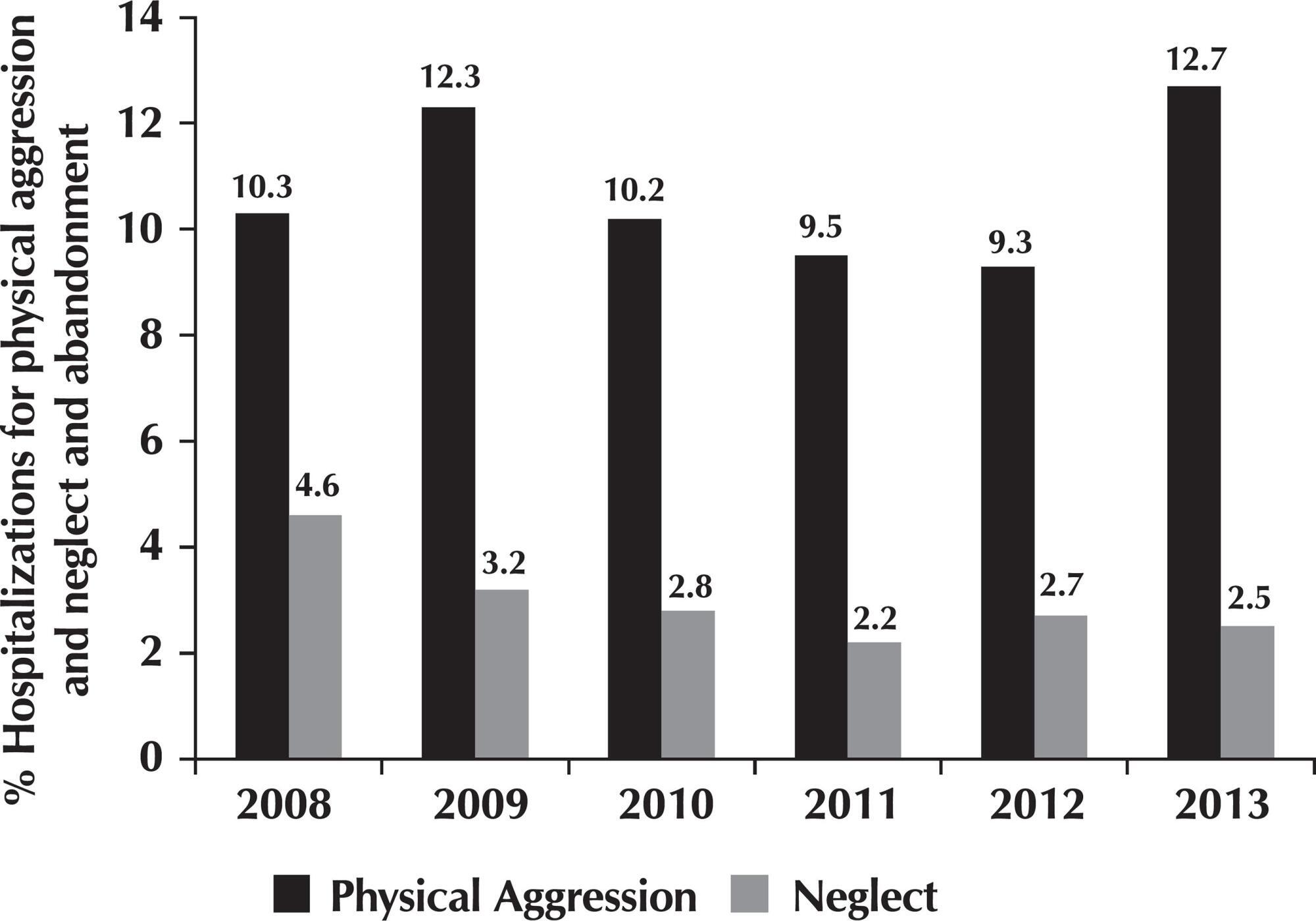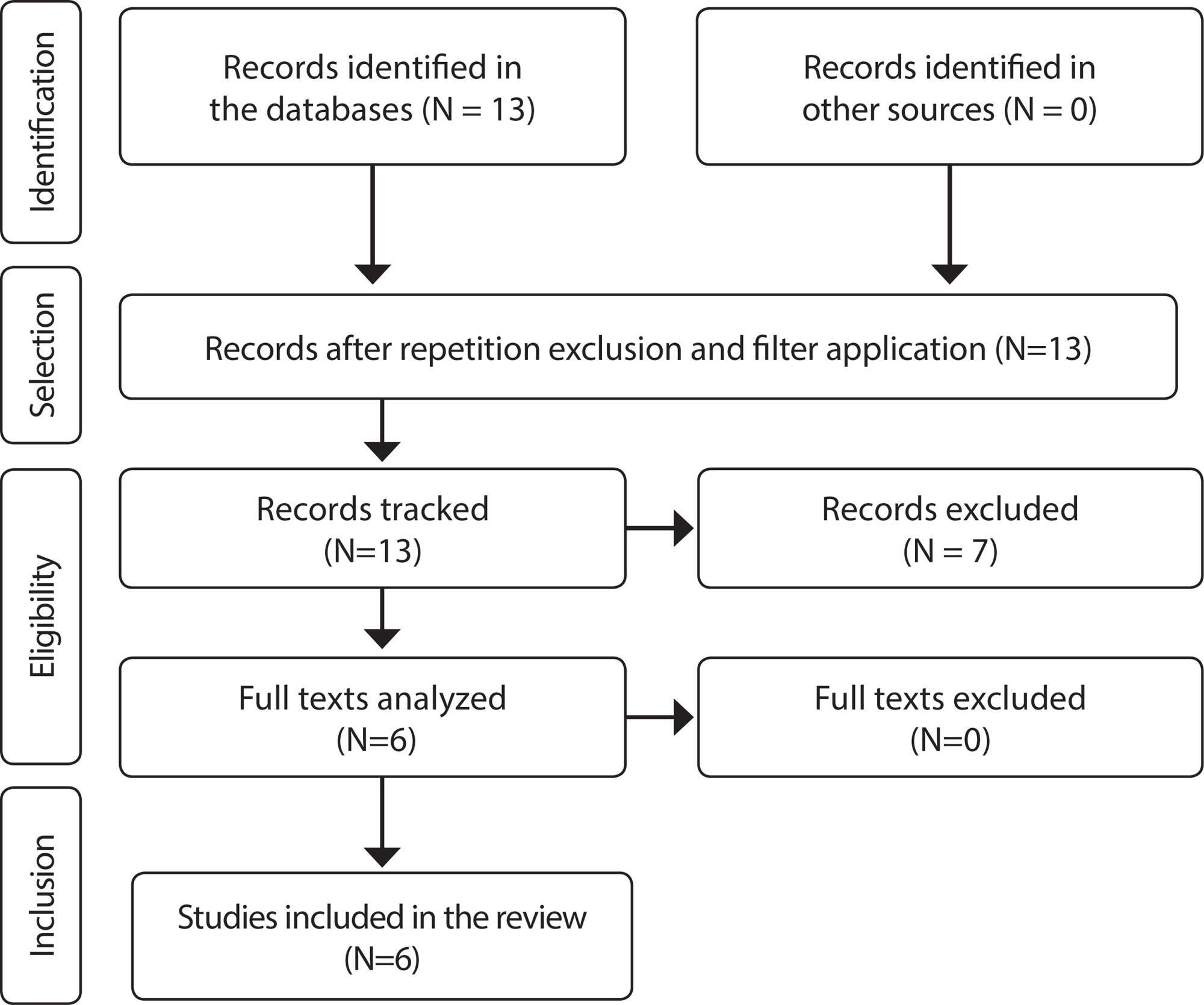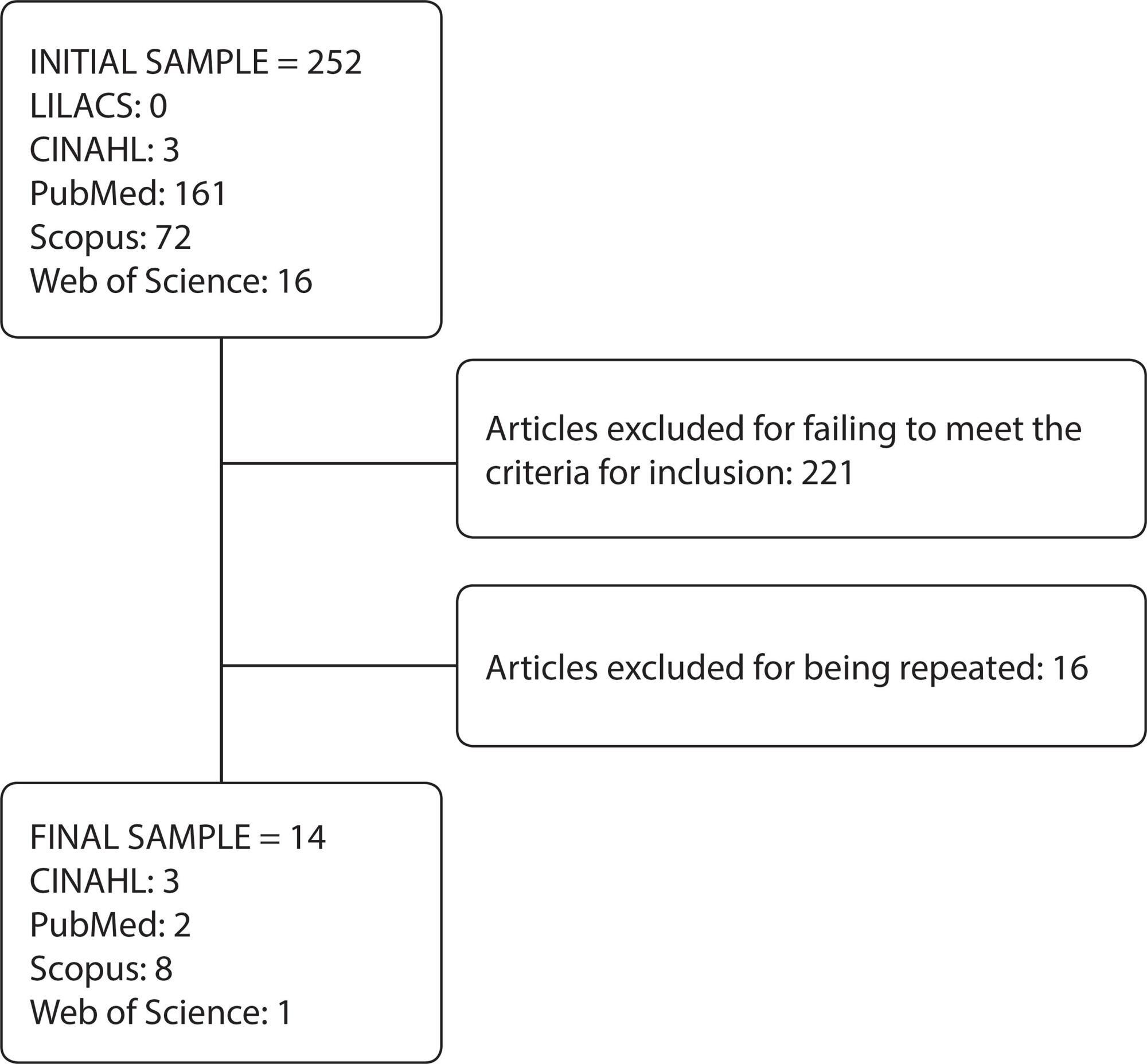-
RESEARCH01-01-2018
Effects of health education in the elderly with mild cognitive impairment
Revista Brasileira de Enfermagem. 2018;71:801-810
Abstract
RESEARCHEffects of health education in the elderly with mild cognitive impairment
Revista Brasileira de Enfermagem. 2018;71:801-810
DOI 10.1590/0034-7167-2017-0032
Views0See moreABSTRACT
Objective:
to analyze the effects of health education on both cognition and depressive/anxiety symptoms in the elderly with Mild Cognitive Impairment (MCI).
Method:
this is a randomized and controlled clinical trial. Participants (n=22) were recruited from a specialized outpatient clinic, and assigned into two groups: a Health Education Group (HEG) (n=10) and a Control Group (CG) (n=12). The participants were evaluated before and after the intervention, which was composed of classes and dynamics. The intervention consisted of 20 meetings, over a period of five months. The assessment was performed by means of the Addenbrooke’s Cognitive Examination – Revised (ACER), the Mini-Mental State Examination to access participant’s cognitive state, and the Beck’s Scale to access depressive/anxiety symptoms. A Memory Complaints Scale (EQM) was also used. The analysis was carried out using the Student’s t test for paired samples.
Results:
the HEG group demonstrated an improvement in attention/orientation (p= 0,026), memory (p=0.001), language (p= 0.033), and ACE-R (p= 0.003). On the other hand, the CG did not present improvement.
Conclusion:
the results highlight the importance of non-pharmacological interventions in older adults with MCI to reduce cognitive deficits.

-
RESEARCH01-01-2018
Self-care of elderly people after the diagnosis of acquired immunodeficiency syndrome
Revista Brasileira de Enfermagem. 2018;71:793-800
Abstract
RESEARCHSelf-care of elderly people after the diagnosis of acquired immunodeficiency syndrome
Revista Brasileira de Enfermagem. 2018;71:793-800
DOI 10.1590/0034-7167-2017-0248
Views0See moreABSTRACT
Objective:
to characterize the seropositive elderly for the Human Immunodeficiency Virus and Acquired Immunodeficiency Syndrome (HIV/AIDS) in their socio-demographic aspects; to understand how the elderly take care of themselves from the diagnosis of HIV/AIDS.
Method:
Qualitative, descriptive, exploratory research conducted at a Voluntary Counseling and Testing Center with 10 elderly people receiving treatment for HIV/AIDS. The data were analyzed according to the content analysis.
Results:
Data show the elderly people’s lack of knowledge about HIV/AIDS transmission, the experience of being elderly and having HIV/AIDS, caring for oneself and life after diagnosis of HIV/AIDS in their daily lives.
Final considerations:
The diagnosis of HIV/AIDS seropositivity in the elderly generates a blend of feelings and fears that lead to food changes, adherence to treatment and the renunciation of daily and social habits, manifested as ways of self-care.
-
RESEARCH01-01-2018
Educational technology: a facilitating instrument for the elderly care
Revista Brasileira de Enfermagem. 2018;71:786-792
Abstract
RESEARCHEducational technology: a facilitating instrument for the elderly care
Revista Brasileira de Enfermagem. 2018;71:786-792
DOI 10.1590/0034-7167-2017-0129
Views0See moreABSTRACT
Objective:
To develop educational technology with caregivers of older people based on the needs, difficulties and concerns related to the elderly care expressed by the caregivers themselves.
Method:
Research of qualitative nature, with participant observation, based on concepts used by Paulo Freire. Data collection and analysis used the “World Cafe” methodology and the thematic content analysis, respectively.
Result:
The needs of these caregivers refer to their training and information on aging. The difficulties highlighted are deterrents to quality assistance to older adults, such as: insufficient resources, environmental factor and relationship with the family. The interests are evident in relation to the care and to its more subjective relationship.
Final considerations:
Educational technologies, printed matter and media, developed along with the caregivers, contribute to orientation and information of caregiver, population and professionals as facilitating instruments, regarding elderly care.
-
RESEARCH01-01-2018
Violence against the Brazilian elderlies: an analysis of hospitalizations
Revista Brasileira de Enfermagem. 2018;71:777-785
Abstract
RESEARCHViolence against the Brazilian elderlies: an analysis of hospitalizations
Revista Brasileira de Enfermagem. 2018;71:777-785
DOI 10.1590/0034-7167-2017-0139
Views0See moreABSTRACT
Objective:
to identify the prevalence of physical aggression and neglect and abandonment in the hospitalizations of Brazilian elderly people for violence and assault from 2008 to 2013 and the association of these causes with socio-demographic variables related to hospitalization.
Method:
quantitative, descriptive, cross-sectional study with elderlies hospitalized for assault. Inclusion criteria: to be 60 years old or over, to have been hospitalized in the Unified Health System (SUS) for assault or neglect and abandonment, between 2008 and 2013. The data were collected in February 2016, in Datasus database and descriptive and inferentially, using the Chi-square distribution, in the Epi Info 3.5.4 program.
Results:
the prevalence of hospitalizations due to assaults and violence prevailed among 60 and 69 years old men in the public sector. For abandonment and neglect, there was a higher prevalence in women, over 80 years old, in the public sector.
Conclusion:
nurses must be able to identify and prevent violence against the elderly.

-
RESEARCH01-01-2018
The meaning of religion/religiosity for the elderly
Revista Brasileira de Enfermagem. 2018;71:770-776
Abstract
RESEARCHThe meaning of religion/religiosity for the elderly
Revista Brasileira de Enfermagem. 2018;71:770-776
DOI 10.1590/0034-7167-2017-0120
Views0See moreABSTRACT
Objective:
To understand the meaning of religion/religiosity for the elderly.
Method:
A qualitative, phenomenological study, based on Martin Heidegger. Thirteen older women registered in an Urban Social Center of Salvador, Bahia, Brazil aged between 60 and 84 years participated in the study. The collection of testimonies was carried out from November 2013 to May 2014 through phenomenological interviews.
Results:
Hermeneutics has unveiled the unit of meaning: Meanings of religion/religiosity in the daily life of the elderly. Religion/religiosity offers comfort and well-being to the elderly person, helping to overcome changes arising from the aging process.
Final considerations:
The nurse, while providing care, should expand his/her vision in relation to the subjectivity of the elderly, in order to understand that religion/religiosity gives meaning to their existence.
-
RESEARCH01-01-2018
Repercussions of hospitalization due to fall of the elderly: health care and prevention
Revista Brasileira de Enfermagem. 2018;71:763-769
Abstract
RESEARCHRepercussions of hospitalization due to fall of the elderly: health care and prevention
Revista Brasileira de Enfermagem. 2018;71:763-769
DOI 10.1590/0034-7167-2017-0069
Views0See moreABSTRACT
Objective:
To know the repercussions of the fall reported by the elderly and their caregiver during hospitalization in a public hospital in Florianópolis city from October to December 2014.
Method:
Exploratory research with a qualitative approach, conducted by depth interviews with 16 participants, the eight elderly were hospitalized for falls and eight elderly caregivers. Data analysis were performed through the Thematic Content Analysis.
Results:
It was evidenced the thematic axis: Faller Elderly supported by four thematic categories: Changes caused by Falls, I am a faller, I take care of me and Prevention of the Fall. The repercussions of the fall were evidenced in the impairment of the health condition, self-care and functional capacity. We observed the naturalization of the phenomenon and the passivity with the harmful consequences of the event.
Final Considerations:
The fall is valued the more negative its repercussion, such as the need for hospitalization and surgery. Managing the vulnerability of the elderly, especially in primary care, evaluating their comorbidities and their internal and external environment, will minimize unfavorable consequences and the social and financial cost of hospitalizations.
-
RESEARCH01-01-2018
Suicidal ideation and attempt of older women in Northeastern Brazil
Revista Brasileira de Enfermagem. 2018;71:755-762
Abstract
RESEARCHSuicidal ideation and attempt of older women in Northeastern Brazil
Revista Brasileira de Enfermagem. 2018;71:755-762
DOI 10.1590/0034-7167-2017-0413
Views0See moreABSTRACT
Objective:
to associate the life experiences of older women from the Northeast of Brazil with their suicidal ideation and attempts.
Method:
Qualitative study with fourteen older adults from Piripiri (PI), Teresina (PI), Fortaleza (CE) and Recife (PE) who were interviewed between November 2013 and July 2014. The organization of data originated the themes: experiences of abuse throughout their lives; marital fractures and social isolation; weakened motherhood.
Results:
The women were born and lived most of their life in the countryside, amid poverty and social exclusion. They had a history of abuse, physical and sexual violence, perpetrated by intimate partners and/or family members. They experienced social isolation, weakened emotional bonds and several suicide attempts.
Final considerations:
The life of these older women was affected by traumatic events that enhanced feelings of hopelessness, depressive symptoms and the absence of a plan for the future, making them consider suicide as a way to anticipate death.
-
RESEARCH01-01-2018
Validation of the Falls Efficacy Scale – International in a sample of Portuguese elderly
Revista Brasileira de Enfermagem. 2018;71:747-754
Abstract
RESEARCHValidation of the Falls Efficacy Scale – International in a sample of Portuguese elderly
Revista Brasileira de Enfermagem. 2018;71:747-754
DOI 10.1590/0034-7167-2017-0497
Views0See moreABSTRACT
Objective:
to translate and adapt Falls Efficacy Scale – International (FES-I). To analyze the psychometric properties of the FES-I Portugal version.
Method:
psychometric study. Sample consisting of 170 elderly people residing in the Autonomous Region of Madeira. A two- part form was used (sociodemographic characterization and FES-I Portugal). The cross-cultural adaptation was performed and the following psychometric properties were evaluated: validity (construct, predictive, and discriminant), reliability (Cronbach’s alpha), and inter-rater reliability.
Results:
the results allow us to verify a dimension of less demanding physical activities and another of more demanding physical activities. The inter-rater reliability study was 0.62, with an interclass correlation coefficient of 0.859, for a 95% confidence interval. The internal consistency of the Portuguese version was 0.962.
Conclusion:
the validity and reliability of the FES-I Portugal are consistent with the original version and proved to be appropriate instruments for evaluating the “impaired walking” and “risk of falls” nursing diagnoses in the older people.
-
ORIGINAL ARTICLE03-24-2021
Development, validation and application of clinical simulation scenarios for assessment of stomatherapy specialists
Revista Brasileira de Enfermagem. 2021;74(1):e20200360
Abstract
ORIGINAL ARTICLEDevelopment, validation and application of clinical simulation scenarios for assessment of stomatherapy specialists
Revista Brasileira de Enfermagem. 2021;74(1):e20200360
DOI 10.1590/0034-7167-2020-0360
Views0See moreABSTRACT
Objectives:
to build and validate three clinical simulation scenarios and report the application with candidates for the specialist’s degree in stomatherapy.
Methods:
methodological study, building three scenarios and evaluation checklists; content validation with judges, using content validity index and Modified Kappa Coefficient; pre-test and application.
Results:
scenarios built based on nursing care for: 1. insufficiency and venous ulcer; 2. demarcation of intestinal stomia; and 3. Clean intermittent catheterization. In the content validation of the 24 items appreciated, 83%, 80%, and 92% were validated without change. In the pre-test, the objectives and checklists were adjusted. In the application, to standardize the evaluation, actors and evaluators were trained previously, and each candidate passed the three stations.
Conclusions:
scenarios built and with validated content, based on evidence and covering the three areas of stomatherapy. The pre-test allowed for adjustments in the scenarios, and the candidates achieved the expected objectives.
-
REVIEW07-10-2020
Acute Kidney Injury by SARS-CoV-2 virus in patients with COVID-19: an integrative review
Revista Brasileira de Enfermagem. 2020;73:e20200354
Abstract
REVIEWAcute Kidney Injury by SARS-CoV-2 virus in patients with COVID-19: an integrative review
Revista Brasileira de Enfermagem. 2020;73:e20200354
DOI 10.1590/0034-7167-2020-0354
Views0See moreABSTRACT
Objective:
to assess scientific evidence on SARS-CoV-2 Acute Kidney Injury in patients with COVID-19.
Methods:
an integrative review, with adoption of PICO strategy and classification of the level of evidence, carried out on April 10, 2020 in the PubMed database, of articles available between December 2019 and April 2020.
Results:
the sample consisted of six original, five observational and one experimental articles. Observational studies addressed the clinical findings of patients with COVID-19 and association between kidney damage, infection, and morbidity-mortality.
Conclusion:
the studies addressed the mechanism of intracellular infection of SARS-CoV-2, its cytopathic effects on kidney cells and incidence of acute kidney injury in patients infected with SARS-CoV-2. Acute kidney injury is associated with increased mortality and morbidity in these patients. This review realizes the need for new research that can mention kidney care to patients with COVID-19.

-
ORIGINAL ARTICLE12-05-2019
Factors associated with metabolic syndrome in older adults: a population-based study
Revista Brasileira de Enfermagem. 2019;72:221-228
Abstract
ORIGINAL ARTICLEFactors associated with metabolic syndrome in older adults: a population-based study
Revista Brasileira de Enfermagem. 2019;72:221-228
DOI 10.1590/0034-7167-2018-0620
Views0See moreABSTRACT
Objective:
To estimate the prevalence of the metabolic syndrome and clusters of its components and to identify possible associated factors in older adults.
Method:
Cross-sectional and population-based study, involving 271 older people. We collected sociodemographic, behavioral, clinical, biochemical, and anthropometric data. Data were analyzed by descriptive and logistic regression techniques.
Results:
The prevalence of metabolic syndrome was 59% and was associated with women, overweight/obesity, and the C-reactive protein. Concerning the clusters, 11.4% of the sample had all the components of the metabolic syndrome, and only 5.2% of individuals did not have any of its components.
Conclusion:
We found there is a high prevalence of metabolic syndrome and clusters of its components in older adults. It is important to deepen studies on this matter, considering clinical aspects in relation to sex and healthy behavioral habits for creating public policies as well as emphasizing actions aimed at promoting self-care in all cycles of life.

-
08-19-2019
Institutional strategies to prevent violence in nursing work: an integrative review
Revista Brasileira de Enfermagem. 2019;72(4):1052-1060
Abstract
Institutional strategies to prevent violence in nursing work: an integrative review
Revista Brasileira de Enfermagem. 2019;72(4):1052-1060
DOI 10.1590/0034-7167-2018-0687
Views0See moreABSTRACT
Objective:
To analyze the production of research that adopted as object of investigation: institutional strategies, actions and programs to curb and/or prevent the nursing workplace violence.
Method:
Integrative review of 14 articles in full, available in the databases LILACS, PubMed Central, Scopus, CINAHL and Web of Science.
Results:
Of the articles analyzed, most arise from quantitative research (71%), carried out in the United States (65%), with educational actions (57%) and programs (43%), denoting policies.
Conclusion:
Results showed various ways to curb or prevent nursing workplace violence. These are specific strategies, there are few programs deployed worldwide, usually centered in the United States, Canada and Sweden. Most of them is well evaluated and can serve as a model for the development and dissemination of policies according to the needs of each location.

-
08-19-2019
Professional education on dementias in Primary Health Care: an integrative review
Revista Brasileira de Enfermagem. 2019;72(4):1086-1093
Abstract
Professional education on dementias in Primary Health Care: an integrative review
Revista Brasileira de Enfermagem. 2019;72(4):1086-1093
DOI 10.1590/0034-7167-2018-0652
Views0See moreABSTRACT
Objective:
To investigate the most commonly used educational approaches in dementia training for primary health care professionals.
Method:
Integrative literature review, conducted between April and June of 2018, in PubMed, LILACS and IBECS databases. The descriptors used were: Training, Health Personnel, Dementia, Primary Health Care for PubMed; and the MeSH terms, Training Programs, Health Personnel, Dementia, and Primary Health Care for LILACS and IBECS.
Results:
The sample consisted of 13 articles; eight were published in the last five years (62%); seven articles with a quantitative approach (54%); seven articles produced on the European continent (54%), followed by five published on the North American continent (38%). All journals were from the health area (100%).
Conclusion:
Educational strategies were combined and used for education. Significant improvements in knowledge, skills, and attitudes of the teams with regard to professional management of dementias were evidenced.

-
05-21-2021
Quality of life and falls in elderly people: a mixed methods study
Revista Brasileira de Enfermagem. 2021;74:e20200400
Abstract
Quality of life and falls in elderly people: a mixed methods study
Revista Brasileira de Enfermagem. 2021;74:e20200400
DOI 10.1590/0034-7167-2020-0400
Views0See moreABSTRACT
Objective:
to assess elderly people’s quality of life, understanding the social representations of falls.
Methods:
a convergent mixed methods research carried out at homes, with a sample of 134 elderly people. A structured questionnaire was used, covering sociodemographic variables and factors that indicated frailty and risk of falling. For quality of life assessment, Medical Outcomes Study Short-Form 36 and Theory of Social Representations, Abric’s structural approach were used, with data treated by dictionary of equivalent terms, processed in Evoc 2000, converging analytically according to Neuman.
Results:
quality of life impairment was identified in terms of physical, emotional and functional capacity. The elements of the possible central nucleus were fall, fear, and bruised-broken-bone.
Final considerations:
quality of life impairment can contribute to increase the number of falls, which has been shown to be an event present in elderly people’s lives through evocations. Understanding elderly people’s individual demands allows planning actions.

-
ORIGINAL ARTICLE02-10-2020
Common mental disorders in nursing students of the professionalizing cycle
Revista Brasileira de Enfermagem. 2020;73(1):e20180154
Abstract
ORIGINAL ARTICLECommon mental disorders in nursing students of the professionalizing cycle
Revista Brasileira de Enfermagem. 2020;73(1):e20180154
DOI 10.1590/0034-7167-2018-0154
Views0See moreABSTRACT
Objectives:
to verify the suspicion of common mental disorders in nursing students of the professionalizing cycle and the association with sociodemographic features.
Method:
cross-sectional study with a sample of 85 students from a public university in the state of Rio de Janeiro (RJ) who responded to the Self-Report Questionnaire-20 and sociodemographic questions.
Results:
the suspicion prevalence of common mental disorders (CMD) in the sample was 55.3% and it was identified the association with the consumption of alcohol. Of the most frequent SRQ-20 complaints, 95.3% reported “feeling nervous, tense or worried”, 72.9% “having difficulty making decisions”, 60% “sleeping poorly” and 37.6% “having lost interest by things “.
Conclusion:
high prevalence of CMD in the sample and the association with the consumption of alcohol requires preventive and therapeutic actions among the students that minimize the possibility of severe mental disorders related to the consumption of alcohol and other drugs.
-
REVIEW07-13-2020
Prevention and control measures for neonatal COVID-19 infection: a scoping review
Revista Brasileira de Enfermagem. 2020;73:e20200467
Abstract
REVIEWPrevention and control measures for neonatal COVID-19 infection: a scoping review
Revista Brasileira de Enfermagem. 2020;73:e20200467
DOI 10.1590/0034-7167-2020-0467
Views0See moreABSTRACT
Objective:
to identify with the literature the measures to prevent and control neonatal infection by COVID-19.
Methods:
a scope review carried out by searching for studies in databases and institutional health websites. The final sample was 25 articles.
Results:
among the main measures are the use of masks by suspected or infected people in contact with healthy newborns, hand hygiene before and after each care and feeding as well as the tools used for milking. It is indispensable to use personal protective equipment by health professionals in neonatology services to maintain a private room for infected newborns or to use physical barriers. Early diagnosis and timely case management is essential to reduce virus transmissibility.
Conclusions:
the research contributed to elucidate health and nursing actions in preventing and controlling neonatal infection by COVID-19.

Search
Search in:
Nuvem de Tags
Adolescente (85) Atenção Primária à Saúde (239) COVID-19 (91) Criança (91) Cuidados de Enfermagem (269) Educação em Enfermagem (151) Educação em Saúde (139) Enfermagem (930) Enfermagem Pediátrica (86) Estudantes de Enfermagem (77) Estudos de Validação (131) Família (87) Idoso (208) Promoção da Saúde (99) Qualidade de Vida (104) Saúde do Trabalhador (86) Saúde Mental (145) Saúde Pública (82) Segurança do Paciente (150) Tecnologia Educacional (100)



